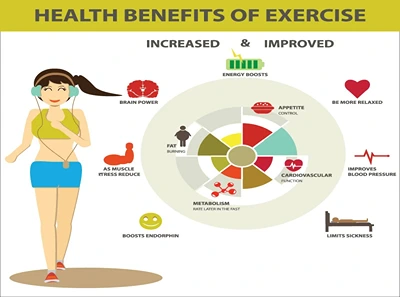Exercise offers a wide range of health benefits that impact various aspects of physical, mental, and emotional well-being. Regular physical activity can significantly enhance your overall health and quality of life. Here are some of the key health benefits of exercise:
- Cardiovascular Health:
- Improved Heart Health: Exercise strengthens the heart muscle, lowers blood pressure, and reduces the risk of heart disease.
- Enhanced Circulation: Regular physical activity improves blood flow, increasing the delivery of oxygen and nutrients to the body’s tissues.
- Weight Management:
- Weight Loss and Maintenance: Exercise can help you burn calories and maintain a healthy weight by increasing your metabolism.
- Muscle Mass Preservation: It helps preserve and build lean muscle mass, which is essential for maintaining a healthy metabolism.
- Muscle and Bone Health:
- Muscle Strength: Resistance training and weight-bearing exercises improve muscle strength, balance, and coordination.
- Bone Density: Weight-bearing exercises like running and weightlifting can increase bone density, reducing the risk of osteoporosis.
- Metabolic Health:
- Blood Sugar Regulation: Exercise can improve insulin sensitivity, helping to manage blood sugar levels and reduce the risk of type 2 diabetes.
- Lipid Profile Improvement: It can lower triglycerides and increase “good” HDL cholesterol, reducing the risk of metabolic syndrome.
- Mental Health:
- Stress Reduction: Physical activity triggers the release of endorphins, which can reduce stress and improve mood.
- Anxiety and Depression Management: Regular exercise can help alleviate symptoms of anxiety and depression, leading to improved mental well-being.
- Better Sleep: Exercise is associated with better sleep quality and can help with sleep disorders.
- Cognitive Health:
- Enhanced Brain Function: Physical activity can improve cognitive function, memory, and concentration.
- Reduced Risk of Cognitive Decline: Regular exercise is linked to a decreased risk of age-related cognitive decline and neurodegenerative diseases like Alzheimer’s.
- Respiratory Health:
- Lung Capacity: Aerobic exercises, such as running and swimming, can improve lung capacity and respiratory health.
- Immune System Support:
- Strengthened Immune Function: Moderate exercise can enhance the immune system, making it more effective in defending against illnesses.
- Cancer Prevention: Regular physical activity is associated with a reduced risk of certain types of cancer, including breast, colon, and lung cancers.
- Pain Management:
- Pain Relief: Exercise can help alleviate chronic pain conditions, such as lower back pain and arthritis, by increasing strength and flexibility.
- Longevity: Regular exercise is linked to a longer lifespan and an increased likelihood of maintaining independence and mobility in older age.
- Social and Emotional Well-being:
- Social Interaction: Participating in group fitness activities can foster social connections and a sense of belonging.
- Improved Self-Esteem: Achieving fitness goals can boost self-esteem and self-confidence.
It’s important to note that the benefits of exercise are not limited to strenuous or structured workouts. Even low-to-moderate-intensity activities, such as walking, gardening, or dancing, can provide health benefits. To maximize the advantages of exercise and ensure safety, it’s advisable to consult with a healthcare professional or fitness expert, especially if you have underlying health conditions or are starting a new exercise program. Remember that consistency is key, and incorporating physical activity into your daily routine can lead to significant improvements in your health and overall well-being.




